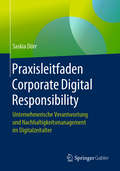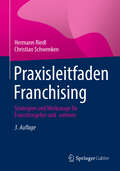- Table View
- List View
Praxislehrbuch Steuerrecht: Schneller Einstieg in die gesetzlichen Grundlagen
by Karin NickenigDieses Praxislehrbuch bietet einen leichten und nachvollziehbaren Überblick über die gesetzlichen Grundlagen der Einkommen-, Umsatz-, Gewerbe- und Körperschaftssteuer für den unternehmerischen Alltag, in dem Existenzgründer, Selbstständige und kaufmännische Angestellte täglich mit steuerrechtlichen Fragen und Herausforderungen konfrontiert werden. Die neu erworbenen oder aufgefrischten Kenntnisse werden mithilfe zahlreicher Beispiele, Kontrollfragen und Übungen mit detaillierten Lösungen vertieft. So gewinnen Kleingewerbetreibende und Jungunternehmer den nötigen Einblick in die für sie relevanten steuerlichen Zusammenhänge und entschlüsseln das Fachvokabular von Behörden und Steuerberatern. Die aktualisierte 4. Auflage wurde auf den Rechtsstand Sommer 2019 gebracht.
Praxisleitfaden Business Planning: Konzeption und Einsatz als finanz- und unternehmensstrategisches Planungstool
by Thomas SchmidtDieses Buch schlägt erstmalig die Brücke zwischen dem Financial Management auf der einen und dem strategischen Management auf der anderen Seite und schließt damit eine eklatante Lücke zwischen diesen beiden Disziplinen. Im Financial Management fokussieren sich die Methoden und Konzepte auf die Geschäftsplanung im Rahmen von Neugründungen – Business Planning als integrativer Teil einer strategischen Planung in bestehenden Unternehmen fehlt ebenso wie eine methodische und praxisorientierte Vorgehensweise zur Verknüpfung von Strategie und Business Plan. Im Ergebnis muss die strategische Planung in einen konsistenten, fokussierten und zielgruppenorientierten Business Plan übersetzt werden, der die Financial Guideline für die kommenden Jahre bildet und die Grundlage für ein operatives Financial Management mit Control-/Feedback- und Action-Management bildet. Ziel dieses Praxisleitfadens ist es, ein konzeptionell stringentes und gleichzeitig praktisch orientiertes Vorgehensmodell zu liefern, das allen an der strategischen Neuausrichtung eines Unternehmens Beteiligten Handreichung für eine erfolgreiche integrative Geschäftsplanung bietet.
Praxisleitfaden Chatbots: Conversation Design für eine bessere User Experience
by Beate Bruns Cäcilie KowaldChatbots sind eine vielversprechende Form der Kommunikation – jedoch schaffen es bisher nur wenige echten Mehrwert zu bieten. In diesem Praxisleitfaden lernen Sie Schritt für Schritt den gesamten Prozess der Chatbot-Entwicklung kennen: Von der Definition des Use Case über die Persönlichkeit des Chatbots und die Modellierung des Dialogablaufs bis hin zu Pilotbetrieb und Roll-Out. Sie erfahren für jeden Schritt, welche Strategien sich bewährt haben und was bei der Umsetzung besonders zu beachten ist. Einen Schwerpunkt bildet das Conversation Design, denn es ist entscheidend für eine gelungene User Experience, für Akzeptanz und langfristigen Erfolg des Chatbots. Anhand zahlreicher Fallbeispiele aus der Praxis und mit klar formulierten Handlungsempfehlungen zeigen die Autorinnen ganz konkret, wie erfolgreiche Chatbots gelingen.Der Inhalt• Bedarfsanalyse, Use Case und User Stories• Planung der Chatbot-Entwicklung• Chatbot-Persönlichkeit und Conversational Experience• Conversation Design, Proof-of-Concept und Prototyping• Dialogablauf und Copywriting • Implementierung, Finetuning und Roll-Out• Evaluation und Continuous Improvement
Praxisleitfaden Corporate Digital Responsibility: Unternehmerische Verantwortung und Nachhaltigkeitsmanagement im Digitalzeitalter
by Saskia DörrDie Digitalisierung transformiert rasant die globale Wirtschaft – mit neuen Problemen für Individuen, Gemeinschaft und den Planeten. Doch was bedeutet dies praktisch für unternehmerische Verantwortung und Nachhaltigkeitsmanagement? Dieses Buch beschreibt fundiert, wie sich Unternehmensverantwortung im Zeitalter von Big Data und Künstlicher Intelligenz verändert und wie Corporate Digital Responsibility zu einem nachhaltigen Wettbewerbsvorteil für Unternehmen im digitalen Wandel führen kann. Es liefert Verantwortlichen in Unternehmen einen umfassenden Leitfaden, wie sie die innovativen Aspekte professionell in der Praxis umsetzen können und versetzt sie in die Lage, den Unternehmenserfolg im Zuge der Digitalisierung gesellschaftlich verantwortlich zu gestalten.Sie erfahren, welche „unerwünschten Nebenwirkungen" die Digitalisierung hat und wie sich Unternehmensverantwortung verändert.Sie können den Status der Corporate Digital Responsibility im Unternehmen bestimmen.Sie sind in der Lage, eine Strategie der Digitalverantwortung zu entwickeln und Managementinstrumente gezielt zur Umsetzung einzusetzen.Sie meistern die Herausforderungen im dynamischen Markt- und Gesellschaftsumfeld und erzielen Wirkung. Best-Practice-Beispiele von namhaften Pionierunternehmen helfen dabei, einen eigenen Weg zu finden.Dieser Leitfaden ist eine Einladung an Führungspersönlichkeiten in Unternehmen, Corporate-Responsibility-Verantwortliche, Nachhaltigkeitsberater und alle Interessierten, die Möglichkeiten einer verantwortungsvollen Digitalisierung kennenzulernen und selbst unternehmerisch auszugestalten. Er bildet einen gut strukturierten Einstieg in das noch junge Fachgebiet des Managements und der Unternehmensführung.
Praxisleitfaden Corporate Digital Responsibility: Unternehmerische Verantwortung und Nachhaltigkeitsmanagement im Digitalzeitalter
by Saskia DörrDieses Buch beschreibt fundiert, wie sich Unternehmensverantwortung im Zeitalter von Big Data und Künstlicher Intelligenz verändert und wie Corporate Digital Responsibility (CDR) zu einem nachhaltigen Wettbewerbsvorteil für Unternehmen im digitalen Wandel führen kann. Es liefert Verantwortlichen in Unternehmen einen umfassenden Leitfaden, wie sie die innovativen Aspekte professionell in der Praxis umsetzen können und versetzt sie in die Lage, den Unternehmenserfolg im Zuge der Digitalisierung gesellschaftlich verantwortlich zu gestalten. Die überarbeitete und erweiterte 2. Auflage wurde um neue Inhalte zur praktischen Umsetzung von CDR, zum digital verantwortlichen Führen und zum verantwortlichen Umgang mit Künstlicher Intelligenz ergänzt. Es gibt einen umfassenden Überblick über aktuelle CDR-Rahmenwerke und -Initiativen sowie neue Erkenntnisse zu CDR-Messung, -Berichterstattung und -Benchmarking.
Praxisleitfaden Customer Centricity: Mit Kundendaten und Customer Experience die digitale Transformation erfolgreich meistern – mit Strategie-Framework und Umsetzungsplan
by Michael Nenninger Melanie SeidelDieses Buch zeigt, warum nur mit den richtigen Kundendaten – dem Öl des 21.Jh., eine Differenzierung am Markt gelingt. Der Kampf um die Daten ist auch ein Kampf um die digitale Kundenschnittstelle, bei dem das Angebot mit der besten Customer Experience gewinnt.Die Autoren erläutern, wie sich Unternehmen durch eine Data Driven Customer Centricity von der Produktverliebtheit lösen und ihre Angebote konsequent am Kundenbedarf ausrichten können.Der Weg zu einer radikalen Kundenzentrierung ist kein Selbstläufer. Schlüsselfaktoren sind ein neues Verständnis des Kundenverhaltens sowie der Mehrwerte von Daten und KI und die darauf ausgerichtete konsequente Transformation der Unternehmenskultur, Strukturen und Prozesse.Hierzu liefern die Autoren mit ihrem in der Praxis erprobten Customer Centricity Transformation Framework (CCTF) einen Handlungsrahmen für Entscheider, der es erlaubt die Veränderungen agil voranzutreiben und dabei die gesamte Organisation mitzunehmen.Aus dem InhaltCustomer Experience und Kundendaten als Motor für die erfolgreiche Customer CentricityWelche Mehrwerte motivieren Kunden heute (noch), Daten abzugeben?Wie die richtigen Daten und KI die Kaufwahrscheinlichkeiten erhöhenDie völlig neue Produkt- und Angebotsgestaltung in Zeiten der Customer CentricityDie Customer-Centricy-Unternehmensorganisation Methodenbaukasten inkl. Vorgehensmodell, Readiness Check und Prototyping-Vorlage
Praxisleitfaden Franchising: Strategien und Werkzeuge für Franchisegeber und -nehmer
by Hermann Riedl Christian SchwenkenFranchisesysteme von Grund auf verstehen, systematisch aufbauen und für alle Beteiligten zum Erfolg machen ist ein komplexes Unterfangen. Wie das geht, erfahren Sie in diesem Buch. Die Autoren geben sowohl Franchisegebern als auch Franchisenehmern wertvolle Strategien und Tools für das Tagesgeschäft an die Hand und liefern Antworten auf grundlegende Fragen: Wie können verschiedene Franchisesysteme aus den unterschiedlichsten Perspektiven bewertet werden? Welche Rolle spielen Regelwerke und deren Inhalte dabei? Wie funktionieren die verschiedenen Prozesse und wie kann die Zusammenarbeit erfolgreich verlaufen? Extra: Direkt in den Arbeitsalltag integrierbare Werkzeuge und Mustervorlagen u.a. zu Mitbewerberanalysen, Dienstplänen, Personalaudits, Tages- und Umsatzplanungen helfen bei der praktischen Umsetzung. Die 2. Auflage wurde um wichtige und erfolgsrelevante Tipps zur Umsetzung ergänzt.
Praxisleitfaden Franchising: Strategien und Werkzeuge für Franchisegeber und -nehmer
by Hermann Riedl Christian SchwenkenFranchisesysteme verstehen, systematisch aufbauen und für alle Beteiligten zum Erfolg machen ist ein komplexes Unterfangen. Wie das geht, erfahren Sie in diesem Buch. Franchisegeber wie auch Franchisenehmer erhalten wertvolle Strategien und Tools für das Tagesgeschäft und Antworten auf grundlegende Fragen: Wie können verschiedene Franchisesysteme aus den unterschiedlichsten Perspektiven bewertet werden? Welche Rolle spielen Regelwerke und deren Inhalte dabei? Wie funktionieren die verschiedenen Prozesse und wie kann die Zusammenarbeit erfolgreich verlaufen? Wie können Marketingmaßnahmen im Franchisesystem gesteuert werden?Die Autoren liefern wertvolle und direkt in den Arbeitsalltag integrierbare Werkzeuge und Mustervorlagen u. a. zu Mitbewerberanalysen, Dienstplänen, Personalaudits, Tages- und Umsatzplanungen. Die dritte Auflage wurde überarbeitet und um aktuelle Veränderungen in der Rechtsprechung sowie die Themen Lizenzvertrag versus Franchisevertrag, Gebietsschutz und Scheinselbstständigkeit ergänzt.Ein unverzichtbarer Leitfaden für alle, die praxisnahe Informationen zum Thema Franchising suchen und sofort anwenden wollen.
Praxisleitfaden Immobilienanschaffung und Immobilienfinanzierung
by Guido RennertDer Praxisleitfaden ist für alle diejenigen geschrieben, die in Deutschland eine (kreditfinanzierte) Immobilie kaufen oder selbst bauen wollen. Der Autor stellt das Thema anschaulich und leicht verständlich dar, wobei er prägnant und detailliert sowohl an rechtliche als auch an wirtschaftliche Fragestellungen heranführt. Die Inhalte werden anhand von Beispielen mit konkreten Berechnungen und Bezügen zur aktuellen Rechtslage illustriert. Das Berechnungs-Tool hilft bei der Ermittlung der tatsächlichen Kosten einer Kreditfinanzierung.
Praxisleitfaden Kommunales Beteiligungsmanagement
by André TegtmeierSie versorgt uns mit Wasser, Energie, Mobilität, Wohnraum und vielem mehr: die Kommunalwirtschaft. Oft ausgelagert als privatrechtliches Unternehmen, bildet sie das Rückgrat unserer Gemeinden. Eine aktive Unternehmenssteuerung durch die Kommune und ein effizientes Beteiligungsmanagement sind daher von hoher Bedeutung. Schließlich sollen die Unternehmen nicht nur wirksam und sparsam wirtschaften, sondern auch einen engen Kontakt mit dem kommunalen Gesellschafter halten.Ziel dieses Leitfadens ist es, interessierten Leserinnen und Lesern in Verwaltung, Politik, Wissenschaft und Kommunalwirtschaft das Leistungsspektrum des modernen Beteiligungsmanagements näherzubringen. Durch die Vorstellung der Instrumente soll auch kleineren Kommunen die Möglichkeit eröffnet werden, ihr Beteiligungsmanagement individuell zu verbessern.Seit ihrer Gründung im Jahr 1993 bietet die Beratungsgesellschaft für Beteiligungsverwaltung Leipzig mbH (bbvl) der Verwaltung und der Politik wirksame Unterstützung bei der Steuerung des städtischen Beteiligungsvermögens. Die vielfältigen Lösungen, Instrumente und Prozesse, die die bbvl entwickelt hat, bilden die Grundlage für diesen Praxisleitfaden.
Praxisleitfaden Logistik für Nachhaltige Lebensstile (essentials)
by Arbeitskreis Innovative Logistik Für Nachhalt LebensstileDas vorliegende essential enthält eine Reihe von Tools, welche sich im Rahmen des dreijährigen, BMBF-geförderten Projekts „Innovative Logistik für Nachhaltige Lebensstile (ILoNa)“ als besonders hilfreich für die praktische Umsetzung einer Nachhaltigkeitsstrategie von Logistikunternehmen herausgestellt haben. Eine Besonderheit liegt dabei in der konsequenten Umsetzung der Konsumentenperspektive: So wird die Interaktion mit den Endkunden – seien es Käufer im Supermarkt oder Online-Käufer – als erfolgsrelevanter Faktor in die Nachhaltigkeitsstrategie miteinbezogen und es wird Unternehmen der Logistikbranche aufgezeigt, wie sie ihre zentrale Rolle als verbindendes Element von Wertschöpfungsstufen und Akteuren verantwortlich wahrnehmen können.
Praxisleitfaden Online-Kurs: Kurse auf digitalen Plattformen rechtssicher erstellen und vermarkten
by Esther-Maria RoosDieses Buch vermittelt einen praxisorientierten Zugang zu den rechtlichen Themen, die bei der Erstellung und dem Vertrieb von Onlinekursen wichtig sind. Von der Konzeption der Inhalte über die verschiedenen Vertriebsmodelle bis hin zur Planung eines rechtssicheren Launches auf unterschiedlichen Wegen erläutert die Autorin die wesentlichen Fragestellungen und bietet leicht umsetzbare Lösungsansätze. Checklisten, Projektpläne und Formulare helfen dabei, den (ersten) eigenen Onlinekurs rechtssicher auf den Weg zu bringen.Das Buch richtet sich an alle, die ihr Spezialwissen erstmalig auf Online-Plattformen anbieten möchten. Seien es Trainer, Lehrende, Coaches oder Expertinnen und Experten für besondere Themen. Es ist auch dann interessant, wenn ein bestehender Kurs überarbeitet oder professionell vertrieben werden soll.
Praxisleitfaden Unternehmensethik: Kennzahlen, Instrumente, Handlungsempfehlungen
by Daniel DietzfelbingerUnternehmens- und wirtschaftsethische Fragen entscheiden zunehmend über Erfolg oder Misserfolg von Unternehmen. Welche Leitbilder, Haltungen und Kulturen gibt es, welchen Einfluss haben Moralvorstellungen von Führungspersönlichkeiten und der Charakter der Organisation auf Managementprozesse von Unternehmen und Organisationen?Die Wirtschaft und ihre Akteur*innen sehen sich drängenden Fragen der Gesellschaft gegenüber: Die Gesellschaft akzeptiert es längst nicht mehr, dass Wirtschaften im Verborgenen und zum Wohl einzelner Personen stattfindet. Die zunehmende Ablehnung der Privatisierung der Gewinne bei gleichzeitiger Sozialisierung der Schäden fordert Führungspersönlichkeiten und Organisationen heraus, sich unternehmens- und wirtschaftsethischen Fragen zu stellen und darauf befriedigende Antworten zu geben. Es geht um Fragen der individuellen Haltung von Verantwortlichen, um die Kultur von Organisationen sowie um die Gestaltung der großen umwelt- und wirtschaftspolitischen Fragen.Der Autor erläutert in diesem Praxisleitfaden, der nun bereits in der 3., überarbeiteten und aktualisierten Auflage vorliegt, die vermeintlichen Geheimnisse der Ethik und deren Relevanz für Einzelne wie für Organisationen. Die Leser*innen erfahren anhand von Praxisbeispielen, dass ethische Fragen im unternehmerischen Alltag ständig präsent sind. Der Autor zeigt, wie unternehmensethische Konzepte in strategische Managementprozesse einfließen und so zum Erfolgsfaktor werden können.
Praxisleitfaden betriebliche Altersvorsorge: Alles Wichtige Für Den Täglichen Einsatz
by Robert SchwarzAltersarmut? Nein danke! Handlicher Praxisleitfaden zur bAV für Vermittler, Personalverantwortliche und BeraterDieser Leitfaden aus der Praxis für die Praxis erläutert übersichtlich und auf das Wesentliche reduziert die aktuellen Regelungen zur betrieblichen Altersvorsorge. Die vorliegende 3. Auflage wurde im Zuge des Gesetzes zur Stärkung der betrieblichen Altersvorsorge gründlich überarbeitet und aktualisiert. Sie berücksichtigt alle relevanten Neuregelungen ab Januar 2019. Das Buch ist insbesondere für Vermittler direkt vor Ort beim Kunden einsetzbar, dient aber auch Steuerberatern, Personalverantwortlichen, Geschäftsführern kleinerer Unternehmen und Freiberuflern als Einführung in die komplexe Materie sowie als handliches Nachschlagewerk.
Praxisleitfaden für Führungskräfte im öffentlichen Dienst: Den Führungsalltag erfolgreich gestalten
by Kristof Tobias GermerDieses Buch vermittelt Führungskräften in der öffentlichen Verwaltung einen praxisorientierten Blickwinkel auf die Gestaltungsmöglichkeiten der täglich anfallenden Aufgaben in den Bereichen Führung und Management. Das Buch bündelt und vertieft dazu auf praxisnahe Weise Hintergrundwissen und hält Tipps für die praktische Anwendung bereit. Die Vermittlung von theoretisch fundiertem Basiswissen wird mit relevanten Praxisempfehlungen verbunden, wodurch im tagtäglich wahrgenommenen Aufgabenportfolio von Führungskräften im öffentlichen Dienst erfolgversprechender Mehrwert ermöglicht wird.Das Buch unterstützt Führungskräfte im öffentlichen Sektor dabei, das Thema Führung und Management für ihren zeitlich eng bemessenen praktischen Arbeitsalltag pragmatisch und anwendungsorientiert zu erfassen und vermittelt zeitgleich präzises Wissen, um den Führungskräftealltag erfolgreicher zu gestalten. Neben der Darstellung wesentlicher Führungs- und Managementaspekte des Führungskräftealltages und den damit verbundenen Aufgaben sowie ihrer Einordnung in einen praxisverständlichen theoretischen Hintergrund, schließt jedes Kapitel dieses Buches mit einer Auswahl essenzieller Instrumente und Methoden sowie nützlichen Praxistipps. Das Werk kann dank seiner überschaubaren und praxisorientierten Darstellung als alltagsbegleitendes Handbuch jederzeit kurzfristig zu Rate gezogen werden.
Praxisleitfaden für Künstliche Intelligenz in Marketing und Vertrieb: Beispiele, Konzepte und Anwendungsfälle
by Laurenz WuttkeDieser Praxisleitfaden des Daten-Experten Laurenz Wuttke zeigt, was der Einsatz von Künstlicher Intelligenz in Marketing und Vertrieb leisten kann. Systematisch und verständlich führt der Autor seine Leser durch die Zukunftswelt, in der Daten den Unternehmenserfolg bestimmen. Diese Welt ist digital, sie nennt sich Data Science. Sie besteht aus einem Code, dessen Anwendung eine individualisierte Kundenkommunikation und eine fortlaufende Skalierbarkeit ermöglicht. Schritt für Schritt erfahren Sie in diesem Buch, wie sich mit Künstlicher Intelligenz die Customer Journey beeinflussen, die Kundenkommunikation personalisieren lässt. Sie erfahren ebenso, wie Sie die Kosten senken, den Einsatz des Marketingbudgets optimieren und Umsätze um ein Vielfaches steigern können. Die Grundlage für diese fortschrittliche Kultur in Unternehmen bieten Daten und deren Entwicklung hin zu selbstlernenden Systemen.Laurenz Wuttke teilt erstmals mit diesem Buch sein Know-how für KI-Anwendungen mit Unternehmen, Managern und Projektverantwortlichen. Er erläutert anhand von beeindruckenden Beispielen, wie die digitale Systeme funktionieren und bietet eine Roadmap vom Proof of Concept zum Regelbetrieb. Aus dem InhaltWie Künstliche Intelligenz unsere Kommunikation verändertDas Problem des klassischen Marketings und die Chance der Künstlichen IntelligenzSo entsteht ein skalierbares Konzept für PersonalisierungKünstliche Intelligenz in der Organisation verankernViele Anwendungsfälle u.a. Next Best Offer, Kundensegmentierung, Churn Prediction oder Uplift Modeling Zahlreiche Praxisbeispiele von führenden E-Commerce-Playern, Handel und Versicherungen bis zum mittelständischen Unternehmen Herausforderungen und Grenzen von KI in Marketing und Vertrieb
Praxismanagement für Physiotherapeuten, Ergotherapeuten und Logopäden: Praxen wirtschaftlich erfolgreich führen
by Barbara BetzAls Physiotherapeut*in, Ergotherapeut*in oder Logopäd*in in eigener Praxis müssen Sie nicht nur fachlich kompetent sein – Sie sollten Ihre Praxis auch wirtschaftlich erfolgreich führen können, um dauerhaft im zunehmenden Wettbewerb des Gesundheitsmarktes bestehen zu können. Dieses Fachbuch fördert Ihr betriebswirtschaftliches Denken und Handeln und unterstützt Praxisinhaber*innen Student*innen und Interessent*innen, die eine Praxisgründung, die Übernahme einer Praxis oder eine freiberufliche Tätigkeit in Erwägung ziehen, mit konkreten Handlungsempfehlungen, zahlreichen Praxisbeispielen, betriebswirtschaftlichen Konzepten für die therapeutische Praxis und praktische Arbeitsmaterialien zum Download. Neu in der 2. Auflage: Ein neues Kapitel 7 zu Existenzgründung, Praxiskauf und selbstständige freiberufliche Tätigkeit; Informationen zu Marketing mit Social-Media-Kanälen und erweitertes Downloadmaterial, außerdem ist die zweite Auflage komplett aktualisiert und überarbeitet.
Praxisorientierte Hochschullehre: Insights in innovative sowie digitale Lehrkonzepte und Kooperationen mit der Wirtschaft
by Cansu Hattula Julia Hilgers-Sekowsky Gabriele SchusterDieses Buch ist von Hochschuldozierenden für Hochschuldozierende verschiedener Fachrichtungen geschrieben. Es liefert einen Überblick über Einsatzmöglichkeiten der praxisorientierten Lehre und reflektiert gleichzeitig Stolpersteine für Lehrende, Studierende und Praxisinstitutionen. Die zahlreichen Beiträge präsentieren ein breites Portfolio praxisorientierter Lehrmethoden sowie vielfältiger Ideen und Inspirationen für eigene Lehrformate. Dabei werden keine Patentrezepte gegeben, sondern die Freiheit der Lehre und die individuelle Anpassung auf die Lehrsituation und ihrer Beteiligten in den Fokus gestellt. Das Werk steigt somit nicht in den wissenschaftlichen Diskurs der Hochschuldidaktik ein, sondern gibt Hilfestellungen auf Basis erfolgreich eingesetzter sowie kritisch reflektierter Lehr- und Lernformen. Einführend werden in einem Überblicksbeitrag die Themen Hochschuldidaktik und praxisorientierte Hochschullehre miteinander verzahnt, um somit eine Basis bezüglich unterschiedlicher Lehr- und Lernmethoden zu legen, die in den beschriebenen Lehrprojekten Anwendung gefunden haben. Der Sammelband ist in sieben Themenbereiche gegliedert, in denen die Praxisorientierung in der Lehre in unterschiedlicher Art und Weise zum Tragen kommt.
Praxisorientierte Unternehmensplanung mit harten und weichen Daten
by Alexander ZimmermannDie Bedeutung der strategischen Planung nimmt in dem Maße zu, wie Unternehmen durch Fusionen, Zu- und Verkäufe komplexer werden. Heute versammeln nicht nur Großunternehmen, sondern zunehmend auch Mittelständler 30 - 150 eigenständige Geschäftseinheiten unter einem Dach. Um unter diesen Bedingungen eine Gesamtstrategie zu erarbeiten, wurde eine Strategieplattform entwickelt, die von namhaften Unternehmen wie Siemens eingesetzt wird. Die Autoren stellen das strategische Informationssystem in mehreren Best-Practice-Beispielen anwenderorientiert vor.
Praxisorientiertes Managementwissen: Die Existenz von Unternehmen in schwierigen Zeiten sichern
by Valentin Schackmann Werner ZieglerUnternehmen sind zunehmend sukzessiven und disruptiven Entwicklungen ausgesetzt und müssen sich entsprechend anpassen, um die eigene Existenz zu sichern. Es geht darum, schnell zu lernen, anpassungsfähig und innovativ zu sein. Möchten Verantwortliche auf den Wandel nicht nur reagieren, sondern ihn aktiv gestalten, benötigen sie grundlegendes und fundiertes Wissen über die aktuellen Veränderungsprozesse. Dieses Fachbuch richtet sich an Führungskräfte, Geschäftsführer, Gesellschafter und Mitarbeiter und hilft dabei, eine übergeordnete, integrierende Perspektive einzunehmen, um verantwortungsvoll sowie zukunftsorientiert entscheiden und handeln zu können. Die Beitragsautoren geben zu nachfolgenden Kernthemen einen verständlichen, wissenschaftlich fundierten und praxisorientierten Überblick: Management ist Entscheidung und Verantwortung Menschliche Entscheidungen verstehen und systematische Entscheidungsfallen vermeiden Unternehmertum – ein vielschichtiges, zeitloses und nachhaltiges Konzept VUCA, Stress und Ressourcen: Analysen und Gestaltungsempfehlungen für Führungskräfte aus wirtschaftspsychologischer Sicht Corporate Governance: Implikationen verantwortungsvoller Unternehmensführung Management by Future – Zukunftstrends als Wegweiser in der Transformation Internationalisierung und Globalisierung Innovationsmanagement: Die acht Felder der Innovation Das Management von Transformation Digitalisierung von Unternehmen Betriebswirtschaftliche Konzepte mit Schwerpunkt Finanzwesen
Praxisorientiertes Marketing: Grundlagen – Instrumente – Fallbeispiele
by Ralf T. KreutzerEs ist Ralf Kreutzer wieder gelungen, die richtigen Schwerpunkte zu setzen. Er macht überzeugend deutlich, dass die bewährten Basics im Marketing auch im Online- und Digital-Zeitalter Gültigkeit haben. Prädiktat: besonders lesenswert!Univ.-Prof. Dr. Dr. h. c. Wolfgang Fritz, Technische Universität Braunschweig und Universität WienDie 6. Auflage wurde umfassend überarbeitet und um wichtige, aktuelle Themen des Online-Marketings und der Digitalisierung ergänzt. Dadurch werden die Stärken der vorherigen Auflagen noch ausgebaut. Prof. Dr. Klaus Gutknecht, Hochschule für Angewandte Wissenschaften MünchenDer Autor fördert durch die Nutzung von „Merk-Boxen“ und „Denkanstößen“ die kritische Auseinandersetzung mit den präsentierten Inhalten. Sehr gut!Prof. Dr. Sabine Haller, Hochschule für Wirtschaft und Recht, BerlinEine unverzichtbare Orientierung im sich immer schneller wandelnden Marketingalltag. Das Buch liefert umsetzungs- und praxisnahes Know-how, ohne sich in Details zu verlieren. Univ.-Prof. Dr. Michael Lingenfelder, Philipps-Universität MarburgEin weiterer Beweis für die besondere Kompetenz von Ralf T. Kreutzer im Marketing, seine große Leidenschaft für die bestmögliche Vermittlung von Wissen und seine besondere Fähigkeit zur Identifikation der wirklich relevanten Themen.Prof. Dr. Wolfgang Merkle, UE – University of Europe for Applied Sciences, Präsident Marketing Club Hamburg Besonders hervorzuheben ist die Erweiterung des klassischen Marketingmix um das fünfte P für Personal. Denn am Ende sind es nach wie vor die Mitarbeiter, die gutes Marketing machen! Prof. Dr. Karsten Kilian, Hochschule Würzburg-Schweinfurt und Markenlexikon.com Prägnante Sprache, überzeugende Gedankenführung, anschauliche Beispiele und zielführende Transferfragen bilden eine geradezu ideale Grundlage, um sich die Welt des Marketings zu erschließen. Univ.-Prof. Dr. Klaus-Peter Wiedmann, Leibniz Universität HannoverNeu ab der 6. AuflageNeu hinzugekommen sind Kapitel zu den Themen Customer Journey Map, spezielle Marktforschungs-Konzepte und Sonderformen der statischen Preis- und Konditionengestaltung.Zusatzmaterial erhalten Sie via App: Laden Sie die Springer Nature Flashcards-App herunter und nutzen Sie exklusive Inhalte, um Ihr Wissen zu prüfen.
Praxisorientiertes Online-Marketing: Konzepte – Instrumente – Checklisten
by Ralf T. KreutzerKunden verbringen inzwischen viel Zeit online. So folgen Unternehmen ihren Kunden ins Internet – B-to-B wie B-to-C gleichermaßen. Dieses Buch beantwortet die wichtigsten damit verbundenen Fragen und präsentiert konkrete Lösungskonzepte, Erfolgsstrategien und zahlreiche Checklisten – von der kanalübergreifenden Ausgestaltung der Customer-Journey über das Controlling bis zur Berücksichtigung rechtlicher Rahmenbedingungen. Den Unternehmen wird bewährtes und neues Handwerkszeug präsentiert, mit dem sie den Einsatz von Marketing-Budgets im Online-Bereich effektiv und effizient gestalten können. In der 4., vollständig überarbeiteten und erweiterten Auflage wurden zentrale Neuerungen in der Online-Welt eingeordnet. Insbesondere wurden die „Plattformen für den Einsatz des Social-Media-Marketings“ grundlegend überarbeitet und es wird auf neue Entwicklungen – z. B. TikTok, Voice-Search, Page-Experience, Text-Performance-Analyse etc. – wesentlich stärker eingegangen. Bei den rechtlichen Rahmenbedingungen wurden von den Rechtsanwältinnen Julia Blind und Rebekka Stumpfrock neue Abschnitte über Datenschutzhinweise und Influencer-Marketing eingearbeitet. Die neu hinzugekommenen ergänzenden Flashcards dienen der Wissensüberprüfung und unterstützen den optimalen Lernerfolg.Die zentrale Herausforderung für jeden Marketer heute ist die Frage, wie die verschiedenen Kanäle und Instrumente des Online-Marketings in die Gesamtkonzeption des Marketings integriert werden können. Das jetzt in 4. Auflage von Kreutzer vorgelegte Werk „Praxisorientiertes Online-Marketing“ kann dazu beitragen, diese anspruchsvolle Aufgabe zu meistern. Hier erfolgt nicht nur eine überzeugende Einordnung des Online-Marketings in das Marketing-Management. Es werden auch die verschiedenen Instrumente und Kanäle erklärt und deren Einsatzfelder und Grenzen überzeugend präsentiert. Online-Marketing-Einsteiger und -Fortgeschrittene erhalten viele erfolgsentscheidende Impulse: von der kreativen Idee und der fundierten Umsetzung bis zum Controlling der verschiedenen Maßnahmen. Wer sich die ganze Welt des Online-Marketings erschließen möchte, findet hier einen kompetenten Leitfaden.Prof. Dr. Dr. h. c. mult. Heribert Meffert
Praxisorientiertes Online-Marketing: Konzepte – Instrumente – Checklisten
by Ralf T. Kreutzer Sonja KloseMenschen verbringen inzwischen viel Zeit online. Unternehmen folgen ihnen ins Internet – B-to-B wie B-to-C gleichermaßen. Dieses Buch beantwortet die wichtigsten damit verbundenen Fragen und präsentiert konkrete Lösungskonzepte, Erfolgsstrategien und zahlreiche Checklisten – von der kanalübergreifenden Ausgestaltung der Customer Journey über das Controlling bis zur Berücksichtigung rechtlicher Rahmenbedingungen. Den Unternehmen wird Handwerkszeug präsentiert, mit dem sie den Einsatz von Marketing-Budgets im Online-Bereich effektiv und effizient gestalten können. In der 5. Auflage wurden von Ralf T. Kreutzer gemeinsam mit der neuen Co-Autorin Sonja Klose zentrale Neuerungen in der Online-Welt eingeordnet. Dazu gehören: Integration der aktuellen Entwicklungen im Bereich Künstliche Intelligenz in allen relevanten Bereichen, Überarbeitung und Ergänzung der strategischen Optionen im Online-Marketing, Integration der aktuellen Entwicklungen in der Online-Werbung, Einbindung neuer Konzepte der Suchmaschinenoptimierung, Ausloten weiterer Facetten des E-Mail-Marketings. Die 5. Auflage von Ralf T. Kreutzer und Sonja Klose zeigt eindrucksvoll, wie dynamisch sich das Marketing entwickelt. Neben den neuen rechtlichen Rahmenbedingungen wurde auch der Einsatz von Künstlicher Intelligenz im Online-Marketing umfassend integriert. Damit bietet das Buch sowohl für Marketing-Studierende als auch für Praktiker im Unternehmen unverzichtbare und aktuelle Inhalte. Eine klare Empfehlung! Martin Nitsche, Präsident des DDV Deutscher Dialogmarketing Verband e. V.
Praxisratgeber Entrepreneurship: Mit der SEAM-Methode zu erfolgreicher Unternehmensgründung und -entwicklung
by Yngve Dahle Kevin ReutherDieses Fachbuch ist für alle geschrieben, die ein Unternehmen gründen, verbessern oder weiterentwickeln wollen. Mit seinen theoretischen Grundlagen und klaren praktischen Empfehlungen ist das Buch unverzichtbar für Entrepreneure, Gründungsinteressierte, Unternehmensentwickler, Anbieter von Förderprogrammen, Banken und Investoren. Es eignet sich auch hervorragend als Teil des Lehrplans in jedem Entrepreneurship-Kurs.Basierend auf moderner Entrepreneurship-Theorie, eigenen empirischen Erkenntnissen sowie dem Feedback von über 25.000 Entrepreneuren haben die Autoren, unterstützt durch das professionelle Umfeld an der Norwegian University of Science and Technology und der Universität Leipzig, ein Vorgehensmodell entwickelt, welches den Aufbau und die kontinuierliche Verbesserung von Entrepreneurship-Projekten ermöglicht. Das Modell, genannt S-E-A-M (Systemic Entrepreneurship Activity Method), besteht aus sieben Schritten, die ausführlich beschrieben und anhand von praktischen Beispielen erläutert werden.Für den deutschen Markt wurde das Fachbuch aus dem Norwegischen übersetzt und von den Autoren aktualisiert und erweitert.Der InhaltDie Entrepreneurship-TheorieS-E-A-M – Die systemische Methode entrepreneurialer AktivitätenSinn und Zweck; RessourcenGeschäftsidee und -modellZiele und Aufgaben Forecast – Prognose der Geschäftsentwicklung
Praxisratgeber Video-Marketing: Strategie, Produktion, Tools, Verbreitung
by Jörg PattissOnline-Videos haben sich zu einem effektiven und unverzichtbaren Werkzeug im Marketing für Unternehmen jeglicher Größe etabliert. Videos können nicht nur relevanten Content in kurzer Zeit anschaulich vermitteln, sondern bedienen den Zuschauer auch auf verschiedenen emotionalen Ebenen und helfen dadurch, eine Beziehung zur Zielgruppe aufzubauen. Dieses Buch erklärt, wie Unternehmen Online-Videos strategisch planen und einsetzen können und erläutert, was es in allen Phasen der Produktion zu beachten gilt: von der Zielsetzung und der Konzeptphase, über Präsentationstechniken und Handwerkszeug beim Dreh, bis hin zur Nachbearbeitung und digitalen Verbreitung.Ein handfester und leicht verständlicher Ratgeber mit unzähligen wertvollen Tipps, Tools, Programmen und Insider-Tricks eines Experten, der wiederholt dazu rät: Einfach mal machen - Übung macht den Meister!Digitales Buch: Laden Sie die Springer Nature ExploreBooks App kostenlos herunter – Abbildungen im Buch per App mit Handy oder Tablet scannen, um Videos zu streamen und Zusatzinformationen zu erhalten.
























